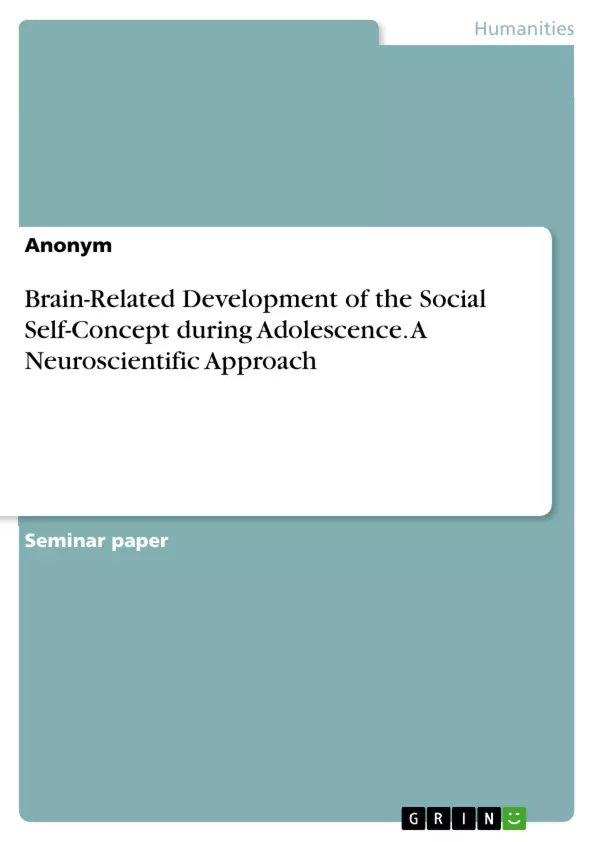In the following passages I want to provide a neuroscientific approach, an overview of the development of the social self-concept and its relation to the development of specific brain regions during adolescence. First, I will introduce the notion of (social) self-concept and how it is individually expressed during different developmental ontogenetic stages. Then I will refer to relevant brain regions and their general and social cognitive functions which are crucial related to the self-concept. The association between the medial prefrontal cortex (mPFC) and the (social) self-concept is especially discussed. I will finish with a brief conclusion which also mentions possible related topics for future research.
Inhaltsverzeichnis (Table of Contents)
- Brain-related development of the social self-concept during adolescence: a neuroscientific approach
- Self-concept as a dynamic ontogenetic construction
- Specific brain regions that are related to the self-concept and their general functions
- Development of the social self-concept during adolescence and associated brain regions
Zielsetzung und Themenschwerpunkte (Objectives and Key Themes)
This paper aims to provide a neuroscientific perspective on the development of the social self-concept during adolescence, examining the interplay between brain maturation and the evolving self-image. It specifically explores the association between the medial prefrontal cortex (mPFC) and the social self-concept during this crucial developmental phase.
- The dynamic construction of the self-concept across developmental stages
- The role of specific brain regions in self-reflection and social cognition
- The development of the social self-concept during adolescence, particularly related to the mPFC
- The influence of social roles, peer relationships, and environmental changes on self-concept development
- The interplay between brain development and self-concept formation.
Zusammenfassung der Kapitel (Chapter Summaries)
- The first section introduces the concept of the social self-concept, outlining its multifaceted nature and how it evolves across different developmental stages. The paper emphasizes the dynamic and interconnected nature of the self-concept, highlighting the influence of age, context, and social interactions on its formation.
- The second section delves into the brain regions associated with the self-concept and their general functions. It explores the roles of various cortical and subcortical structures, including the prefrontal cortex, temporal parietal junction, hippocampus, amygdala, and nucleus accumbens, in facilitating self-reflection, social cognition, emotional processing, and memory.
- The third section focuses on the development of the social self-concept during adolescence, examining the brain regions involved in this process. It discusses the role of the medial prefrontal cortex (mPFC) in self-referential thoughts, perspective-taking, and judgment-making, highlighting the significant changes occurring in this area during adolescence. The section also explores the interplay between brain development and the evolving self-concept during this critical period.
Schlüsselwörter (Keywords)
This paper focuses on the brain-related development of the social self-concept during adolescence, examining the interplay between brain maturation and the evolving self-image. The key concepts explored include the social self-concept, medial prefrontal cortex (mPFC), social cognition, perspective-taking, brain development, adolescence, and self-reflection.
Frequently Asked Questions
How does the social self-concept develop during adolescence?
Adolescence is a crucial phase where social roles and peer relationships significantly influence the dynamic construction of the self-image.
What is the role of the medial prefrontal cortex (mPFC) in this process?
The mPFC is specifically associated with self-referential thoughts, perspective-taking, and making judgments about oneself and others.
Which other brain regions are involved in social cognition?
Key structures include the temporal parietal junction (TPJ), hippocampus, amygdala, and nucleus accumbens, which facilitate emotional processing and memory.
Is the self-concept static throughout life?
No, the paper defines the self-concept as a dynamic ontogenetic construction that evolves across different developmental stages.
What influence do peers have on brain-related self-concept development?
Peer relationships and environmental changes act as external drivers that interact with brain maturation to shape the social self-concept.
- Citation du texte
- Anonym (Auteur), 2021, Brain-Related Development of the Social Self-Concept during Adolescence. A Neuroscientific Approach, Munich, GRIN Verlag, https://www.grin.com/document/1337437



